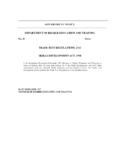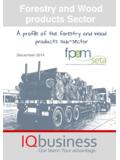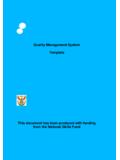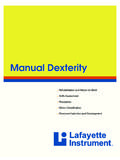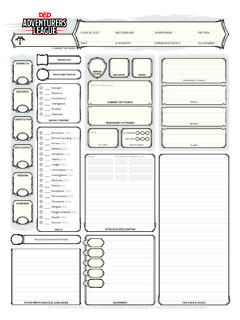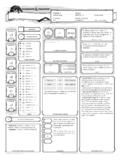Transcription of Assessment Policy QCTO Curriculum and To develop and ...
1 Vision Access, success and progression for all who want a trade, occupation or profession resulting in a skilled, productive and employable citizenry. Mission To develop and quality assure occupational qualifications that are responsive to the labour market needs and developmental state initiatives. QCTO Curriculum and Assessment Policy October 2011. QCTO contact: Email: Version 1: adopted 22 June 2011. QCTO Curriculum and Assessment Policy Version 1: adopted 22 June 2011. Design and Layout: Formeset Digital Tshwane (Pty) Ltd Printing: Formeset Print (Pty) Ltd QCTO Curriculum and Assessment Policy Index 1 Introduction .. 2. 2. Curriculum Framing Concepts .. 2. Occupational Qualifications 2. 2. Occupational 3. Knowledge, Skills and 3. Occupational Qualification .. 4. 4. 3. Occupational Curricula .. 5. Occupational Curriculum .. 5. Learning Components .. 6. Knowledge Component .. 6. Practical Skills Component .. 7. Work Experience 7. 4. Assessment .. 8. Internal Assessment or Assessment Against Curriculum Components.
2 8. External Summative Assessment of Occupational Qualifications or Part 8. Assessment of Foundational Learning .. 9. 5. Quality Partners .. 9. 6. Coordination of Component Provision .. 9. 7. Certification .. 9. Annexure A: Progression .. 9. 1. QCTO Curriculum and Assessment Policy 1. Introduction The Quality Council for Trades and Occupations (QCTO) was established in 2008. by the Skills Development Act to perform the following functions as set out in Chapter 6C Section 26H, 26F and 26J of the SDA (Act No 97 of 1998): Design and develop occupational standards and qualifications and submit them to the South African Qualifications Authority for registration on the National Qualifications Framework;. Establish and maintain occupational standards and qualifications;. Ensure the quality of occupational standards and qualifications and learning in and for the workplace;. Promote the objectives of the National Qualifications Framework;. Liaise with the National Skills Authority on the suitability and adequacy of occupational standards and qualifications and on the quality of learning in and for the workplace.
3 Liaise with the South African Qualifications Authority, other Quality Councils and professional bodies responsible for establishing standards and qualifications or the quality assurance of standards and qualifications; and Perform any other prescribed function. Among the tasks undertaken by the QCTO with a view to operationalise its responsibilities are the development of a qualifications sub-framework for trades and occupations and the design of curricula leading to the qualifications recognised in the sub-framework. This document presents the QCTO Curriculum development and Assessment model. A second document will address the accreditation of providers and Assessment centres. A third document will cover monitoring and evaluation. Together the three documents constitute the QCTO's quality assurance model. 2. Curriculum Framing Concepts Occupational Qualifications Sub-Framework The Occupational Qualifications sub Framework is built on occupations as defined in the Organising Framework of Occupations.
4 Occupation An occupation 1 is a cluster or group of similar jobs that share many common occupational tasks of similar complexity and require similar performance across different processes and industries. The range and depth of the occupational tasks to be clustered under the heading 1. Occupations include trades and professions. 2. QCTO Curriculum and Assessment Policy of a single occupation is a technical and organisational matter as well as a matter requiring social agreement. Occupational Profile The occupational profile includes a statement of the purpose and tasks to be performed by an individual. Each occupational task is defined as a combination of the product or service to be delivered, the occupational responsibility towards that product or service and the occupational context within which that product or service is provided. An occupational task is therefore not a mechanical or rote completion of actions and is frequently internationally benchmarked. There are seldom more than 8.
5 Occupational tasks associated with a specific occupation. The occupational profile is developed by expert practitioners (practitioners in the occupation). Knowledge, Skills and Occupations The performance of occupational tasks is underpinned by knowledge and skills. Knowledge and skills can be classified depending on its content, structure, the manner in which individuals are inducted into it, and the nature and type of mechanisms for its regulation. Occupational (including professional) knowledge and skills are characteristically determined by contextual coherence, that is by a set of external requirements which guide the performance/practice of the occupation. Taking this into account it is possible to identify three components involved in occupations: Conceptual knowledge / theory and information (this knowledge is acquired systematically through a set of purposefully organised learning activities . this component is offered by a skills development provider). Practical / applied knowledge and skills (this knowledge focuses on the ability to perform certain skills at a particular level safely, productively, within legal prescripts and with due regard for social responsibility this component may be acquired in a simulated environment).
6 Work experience (this experience focuses on the ability to integrate conceptual knowledge and practical skills in concrete situations in the work place). A combination of all three components is necessary to obtain competence in terms of qualifications in the occupational sub-framework and the selection and proportion of these is driven by the occupational purpose as well as the need to ensure progression. These three Curriculum components are described further in section 3. QCTO Curriculum and Assessment Policy Occupational Qualification The purpose of an occupational qualification is to specify the requirements that a learner must meet to be certified as competent to practice an occupation, or a specialisation related to an occupation, reflected on the Organising Framework for Occupations (OFO). The SDA defines an occupational qualification as a qualification associated with a trade, occupation or profession, resulting from work-based learning and consisting of knowledge unit standards, practical unit standards and work experience unit standards'.
7 Occupational qualifications or part qualifications will be awarded after a summative Assessment for an occupational qualification or award in terms of the rules of combination. The Assessment is based on the exit level outcomes which are derived from the occupational purpose and tasks. Formal recognition of competence is recognised by certification. Progression The QCTO will develop related occupational qualifications and associated curricula within a National Occupational Pathway Framework (NOPF) family to ensure progression from the lower levels to higher levels in progressive steps2. The diagram below presents an example of what constitutes a NOPF family. 2. See Annexure A for more information on progression pathways. 4. QCTO Curriculum and Assessment Policy 3. Occupational Curricula Occupational Curriculum An occupational Curriculum is derived from the occupational profile and is the purposeful combination of conceptual, practical and work experience knowledge and skills in order to achieve a certain occupational qualification.
8 An occupational Curriculum is a guide on the content to be covered within the three learning components (conceptual knowledge, practical skills and work experience). to ensure consistency in the provision and internal Assessment of the associated occupational qualification to Skills Development Providers to develop lesson plans, learning material and assessments (internal). on requirements for accreditation for the development of the external summative Assessment An occupational Curriculum comprises an occupational profile and specifications for each of the three learning components of the Curriculum . The figure below provides an outline of framework and relationships. 5. QCTO Curriculum and Assessment Policy *At the higher levels the range of tasks to be performed are defined in relation to the scope and depth of the context. For the purposes of learning and Assessment one or more components can be integrated. Learning Components The Skills Development Act (No. 97 of 1998) identifies three components in its definition of occupational qualifications: a qualification consisting of knowledge unit standards, practical unit standards and work experience unit standards The Curriculum model recognizes that expert practice requires a complex interplay of knowledge and skills in a range of working environments.
9 However the pathway to that end requires the disaggregation of the different component parts and the development of a reflexive ability to apply the knowledge and skills to new contexts. Each component will embody the critical cross field outcomes. The Curriculum specifies the requirements to be covered in each of these components as described below. Together the components will constitute 100 %, however no component will constitute less than 20 %. Knowledge Component The knowledge component comprises various subject specifications. Knowledge here refers to discipline or conceptual knowledge (including theory) from a recognised disciplinary field found on subject classification systems such as the Classification of Educational Subject Matter (CESM) which an individual has to have in order to perform the tasks identified in the occupational profile proficiently. The knowledge identified is frequently common to a group of related occupations at the same level in the same NOPF family and the level of knowledge to be covered will be built on the knowledge base held by those entering from lower level occupations within the relevant NOPF family.
10 The subject specifications are developed by educationists based on inputs from expert practitioners and are packaged as standardised courses to enable providers to plan their delivery and access standardised funding. The subject specifications guide skills development providers on: the topics and elements thereof that should be covered in the development of lesson plans and learning materials recognized programme or course exemptions (including RPL). internal Assessment activities provider programme accreditation requirements 6. QCTO Curriculum and Assessment Policy Practical Skills Component The practical skills component derives from the roles to be performed. It comprises various practical skill module specifications. Practical skills are defined as the ability to do something, with dexterity and expertise. Skill grows with experience and practice, and could lead to unconscious and automatic actions. Practical skills are more than just the following of rule based actions and includes practical / applied knowledge.
